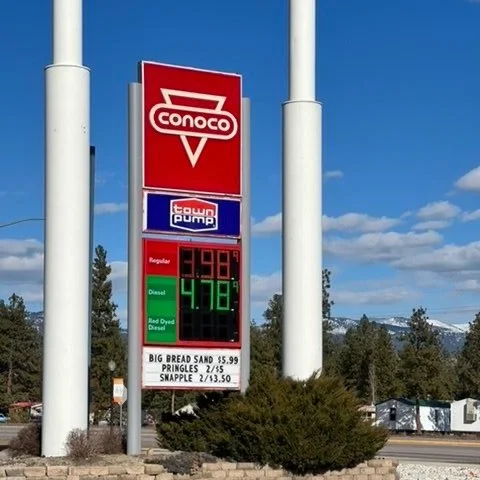The Price of Gas Matters for Many
Gas prices in Florence, MT on March 10.
I don’t know all the reasons my mom finally left my abusive dad on a rainy spring night, but at least one of them had to do with having gas in the car.
For the 13 years they’d been married, my dad controlled the finances, and my mom stayed home to take care of my brother and me, 5 and 8, respectively. That night, in a fit of rage, my dad exploded a soda can against the wall because my brother had muddied his tennis shoes at the park. She didn’t have time to pack, didn’t have a safety net — no coffee can hidden with money somewhere. As he screamed, my mother left with the two of us, the clothes on our backs, and a full tank of gas.
Our story isn’t unique. About 45 million children in the US are exposed to abuse in their childhood, according to the National Institutes of Health. Tens of thousands of people flee intimate partner violence per year. Keeping a car fully fueled is one of the steps suggested in the National Domestic Violence Hotline’s Safety Plan.
That is a lot harder to do when gas costs more than ever before.
Which is why I will never say, “The rising price of gas doesn’t matter. At least I’m safe.” I am, thanks to privilege. But that’s not the case for everyone.
Gas prices do matter.
Lately, I’ve been seeing lots of social media posts admonishing people for complaining about high gas prices. My friends are sharing these posts to encourage perspective in light of the Russian invasion of Ukraine: In most cases, it IS better to pay more money at the pump than to force your kids into an underground bunker.
In one post, words set against a blue- and yellow-background suggest people travel less, carpool, bicycle, walk, or choose public transportation instead of driving. That suggestion is great, but it assumes people living with domestic violence can call their carpool buddy if they need to flee in the middle of the night. It assumes rural Americans can ride the bus to work. It assumes a 10-mile trip to the grocery store can be done with a week’s worth of groceries in the front basket of a bicycle.
It assumes a lot.
Author John Pavlovitz posted a photo of children sleeping shoulder to shoulder in a bunker in Ukraine with the caption, “Humanity in Ukraine is worth more than cheap gas here.”
I understand that perspective, but let’s not lose our humanity for people who struggle in our midst.
These posts lack the ability to examine a complicated issue with nuance. It wants us all in binaries: You’re either a heartless monster who drives a gas guzzler and unrealistically expects to pay $0.99 per gallon or you stand with the people of Ukraine. There is no middle ground, no gray area. I remind myself often that I can hold two things: In this case, compassion for the Ukrainian people and empathy for Americans who live in poverty who will be devastated by this increase.
Gas prices noticeably went up even before Russia invaded Ukraine and countries around the world stopped buying its oil as a punishment. Inflation, more people returning to offices after the pandemic, and the war have pushed the price of gas up from a national average of $3.60 to $4.07 in a matter of a few days. Politicians and economists have explicitly said this will not be the end.
Listen, if you joined the so-called Trucker Convoy last week, this post isn’t for you. You can’t waste gas on a trip to nowhere one week and claim to not be able to afford gas the next. As far as I can tell, the only freedom you demonstrated was the freedom to spend your money in dumb ways. If you rolled coal down Reserve Street, clogging traffic and waving flags featuring snakes, DO NOT USE THIS POST AS EVIDENCE THAT YOU ARE VICTIMIZED BY RISING GAS PRICES.
No, I’m talking to the single parents, the domestic violence victims, the young professionals with astronomical student loan debt, the parents who fell into medical debt fighting cancer. I’m talking to anyone who sits in front of calculations night after night wondering, “How did I get here?”
In her piece “The Mental Load of Being a Poor Mom”, Missoula Author Stephanie Land writes about the hopelessness of trying to make her $6-a-day budget work, only to be hit by an unexpected expense that sent her finances — and stress — spiraling.
Land wrote Maid, a NYT-bestselling memoir that was made into a Netflix show about working as a house cleaner to escape an abusive partner.
“Less money meant more stress in figuring out how to pay bills. It meant standing in the middle of a grocery store aisle, a package of sponges in my hand, crunching numbers in my head to figure out if I could afford it.”
We can assume the same is true when gas prices increase by over 10 percent for people who live in poverty like Land did.
Posts like the ones I’ve seen on Facebook can drive people who are experiencing poverty further into shame, and doing so helps no one: Not the Ukrainian people whose home is under siege, not those who live in poverty, not even the middle-class Americans who feel frustrated and helpless.
If you’re someone who is lucky enough to not have to worry about gas prices, be grateful. And then stop and think before you say other people shouldn’t worry either.


